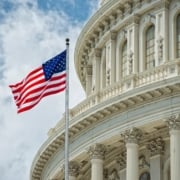Federal Court Upholds U.S. Department of Labor ESG Rule
On September 21, 2023, Judge Matthew J. Kacsmaryk of the U.S. District Court of the Northern District of Texas rejected a challenge by 26 states and upheld the U.S. Department of Labor (DOL) rule that permits fiduciaries of plans subject to the Employee Retirement Income Security Act of 1974 (ERISA) to consider environmental, social, or governance (ESG) considerations under certain circumstances when making investment decisions. By upholding the rule, the court rejected the states’ contention that by allowing ESG considerations, financial interests would be subordinate to nonpecuniary interests. Stakeholders interested in ESG should continue to track this ruling, which may be appealed.
Background
Title I of ERISA establishes minimum standards that govern the operation of private-sector employee benefit plans, including fiduciary responsibility rules. Section 404 of ERISA, in part, requires plan fiduciaries to manage investments for the exclusive purpose of providing benefits to plan participants and their beneficiaries.
On November 13, 2020, the DOL published a final rule, “Financial Factors in Selecting Plan Investments,” which adopted amendments to the investment duties regulation under ERISA that generally require plan fiduciaries to select investments and investment courses of action based solely on consideration of “pecuniary factors.” The November 2020 rule also prohibited adding or retaining any investment fund, product, or model portfolio as a qualified default investment alternative (QDIA) as described in 29 CFR 2550.404c–5 if the fund, product, or model portfolio had nonpecuniary factors as its investment objectives or principal investment goal.
On December 1, 2022, DOL published a final rule, “Prudence and Loyalty in Selecting Plan Investments and Exercising Shareholder Rights,” superseding the previous administration’s rule requiring investments to be selected solely based on “pecuniary factors” and allowing an ESG fund as a QDIA, insofar as the ESG investments are intended to maximize participants’ financial returns. In other words, while the 2022 rule permits ESG factors to be considered in making plan investments, it maintained ERISA plan managers’ longstanding fiduciary duty to prudently determine whether a given ESG consideration is relevant to an investment’s risk and return and to not subordinate the interests of participants and beneficiaries in their plan benefits to other objectives.
Lawsuit and Ruling
Attorneys general from 26 states sued the DOL, alleging DOL’s 2022 rule violated ERISA Section 404 by loosening the fiduciary duty restrictions and allowing ESG considerations that do not necessarily maximize financial benefit for ERISA plan participants. The states also argued the rule was arbitrary and capricious in violation of the Administrative Procedure Act. The court rejected these claims, holding that
- the 2022 rule adequately justified its purpose of clearing up confusion caused by the 2020 rule, which DOL found had a chilling effect on fiduciaries’ consideration of potentially pertinent information when making investment decisions
- the 2022 rule was owed deference under the Chevron doctrine, a principle that agencies should be given latitude to interpret a statute when the statute does not speak to the issue and the agency’s interpretation is reasonable
- there is “little meaningful daylight” between the 2020 rule and the 2022 rule, as both allow ESG investments only to the extent such investments seek to maximize financial returns
Impact and Next Steps
Despite the court’s ruling, the future of the DOL rule is not certain. In addition to a potential appeal, DOL is currently in litigation over the rule against two Wisconsin-based 401(k) plan participants, and the decision relied in part on Chevron deference, a principle that the U.S. Supreme Court may address in its current term.
Beyond these lawsuits, political efforts against ESG are ongoing. President Joe Biden vetoed a bill that would have overturned DOL’s 2022 rule, and some states have enacted legislation limiting ESG investing or prohibiting state governments (including state pension plans, which are not subject to ERISA) from doing business with financial institutions with certain ESG policies. For example, West Virginia and Texas both passed laws severing state government ties with financial institutions that “boycott” fossil fuels (SB 262 and SB 13, respectively).
The uncertain political landscape leaves investors and corporations in a difficult position. On the one hand, global trends are toward ESG disclosure and consideration in investments. On the other hand, anti-ESG measures can pose new risks to organizations that openly discuss ESG. However, as Judge Kacsmaryk noted, when ESG considerations align with maximizing financial returns and/or minimizing risk, fiduciary duty still dictates that such considerations are factored into investment decisions.
This post is as of the posting date stated above. Sidley Austin LLP assumes no duty to update this post or post about any subsequent developments having a bearing on this post.


